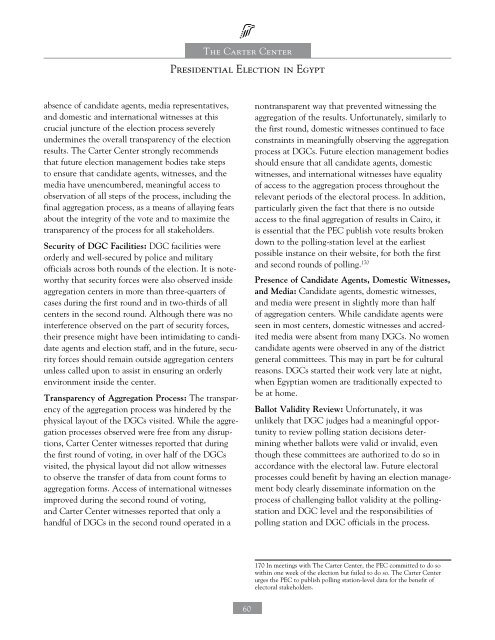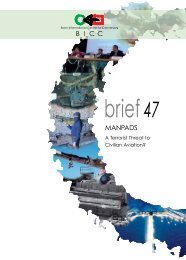egypt-final-presidential-elections-2012
egypt-final-presidential-elections-2012
egypt-final-presidential-elections-2012
You also want an ePaper? Increase the reach of your titles
YUMPU automatically turns print PDFs into web optimized ePapers that Google loves.
The Carter Center<br />
Presidential Election in Egypt<br />
absence of candidate agents, media representatives,<br />
and domestic and international witnesses at this<br />
crucial juncture of the election process severely<br />
undermines the overall transparency of the election<br />
results. The Carter Center strongly recommends<br />
that future election management bodies take steps<br />
to ensure that candidate agents, witnesses, and the<br />
media have unencumbered, meaningful access to<br />
observation of all steps of the process, including the<br />
<strong>final</strong> aggregation process, as a means of allaying fears<br />
about the integrity of the vote and to maximize the<br />
transparency of the process for all stakeholders.<br />
Security of DGC Facilities: DGC facilities were<br />
orderly and well-secured by police and military<br />
officials across both rounds of the election. It is noteworthy<br />
that security forces were also observed inside<br />
aggregation centers in more than three-quarters of<br />
cases during the first round and in two-thirds of all<br />
centers in the second round. Although there was no<br />
interference observed on the part of security forces,<br />
their presence might have been intimidating to candidate<br />
agents and election staff, and in the future, security<br />
forces should remain outside aggregation centers<br />
unless called upon to assist in ensuring an orderly<br />
environment inside the center.<br />
Transparency of Aggregation Process: The transparency<br />
of the aggregation process was hindered by the<br />
physical layout of the DGCs visited. While the aggregation<br />
processes observed were free from any disruptions,<br />
Carter Center witnesses reported that during<br />
the first round of voting, in over half of the DGCs<br />
visited, the physical layout did not allow witnesses<br />
to observe the transfer of data from count forms to<br />
aggregation forms. Access of international witnesses<br />
improved during the second round of voting,<br />
and Carter Center witnesses reported that only a<br />
handful of DGCs in the second round operated in a<br />
nontransparent way that prevented witnessing the<br />
aggregation of the results. Unfortunately, similarly to<br />
the first round, domestic witnesses continued to face<br />
constraints in meaningfully observing the aggregation<br />
process at DGCs. Future election management bodies<br />
should ensure that all candidate agents, domestic<br />
witnesses, and international witnesses have equality<br />
of access to the aggregation process throughout the<br />
relevant periods of the electoral process. In addition,<br />
particularly given the fact that there is no outside<br />
access to the <strong>final</strong> aggregation of results in Cairo, it<br />
is essential that the PEC publish vote results broken<br />
down to the polling-station level at the earliest<br />
possible instance on their website, for both the first<br />
and second rounds of polling. 170<br />
Presence of Candidate Agents, Domestic Witnesses,<br />
and Media: Candidate agents, domestic witnesses,<br />
and media were present in slightly more than half<br />
of aggregation centers. While candidate agents were<br />
seen in most centers, domestic witnesses and accredited<br />
media were absent from many DGCs. No women<br />
candidate agents were observed in any of the district<br />
general committees. This may in part be for cultural<br />
reasons. DGCs started their work very late at night,<br />
when Egyptian women are traditionally expected to<br />
be at home.<br />
Ballot Validity Review: Unfortunately, it was<br />
unlikely that DGC judges had a meaningful opportunity<br />
to review polling station decisions determining<br />
whether ballots were valid or invalid, even<br />
though these committees are authorized to do so in<br />
accordance with the electoral law. Future electoral<br />
processes could benefit by having an election management<br />
body clearly disseminate information on the<br />
process of challenging ballot validity at the pollingstation<br />
and DGC level and the responsibilities of<br />
polling station and DGC officials in the process.<br />
170 In meetings with The Carter Center, the PEC committed to do so<br />
within one week of the election but failed to do so. The Carter Center<br />
urges the PEC to publish polling station-level data for the benefit of<br />
electoral stakeholders.<br />
60



